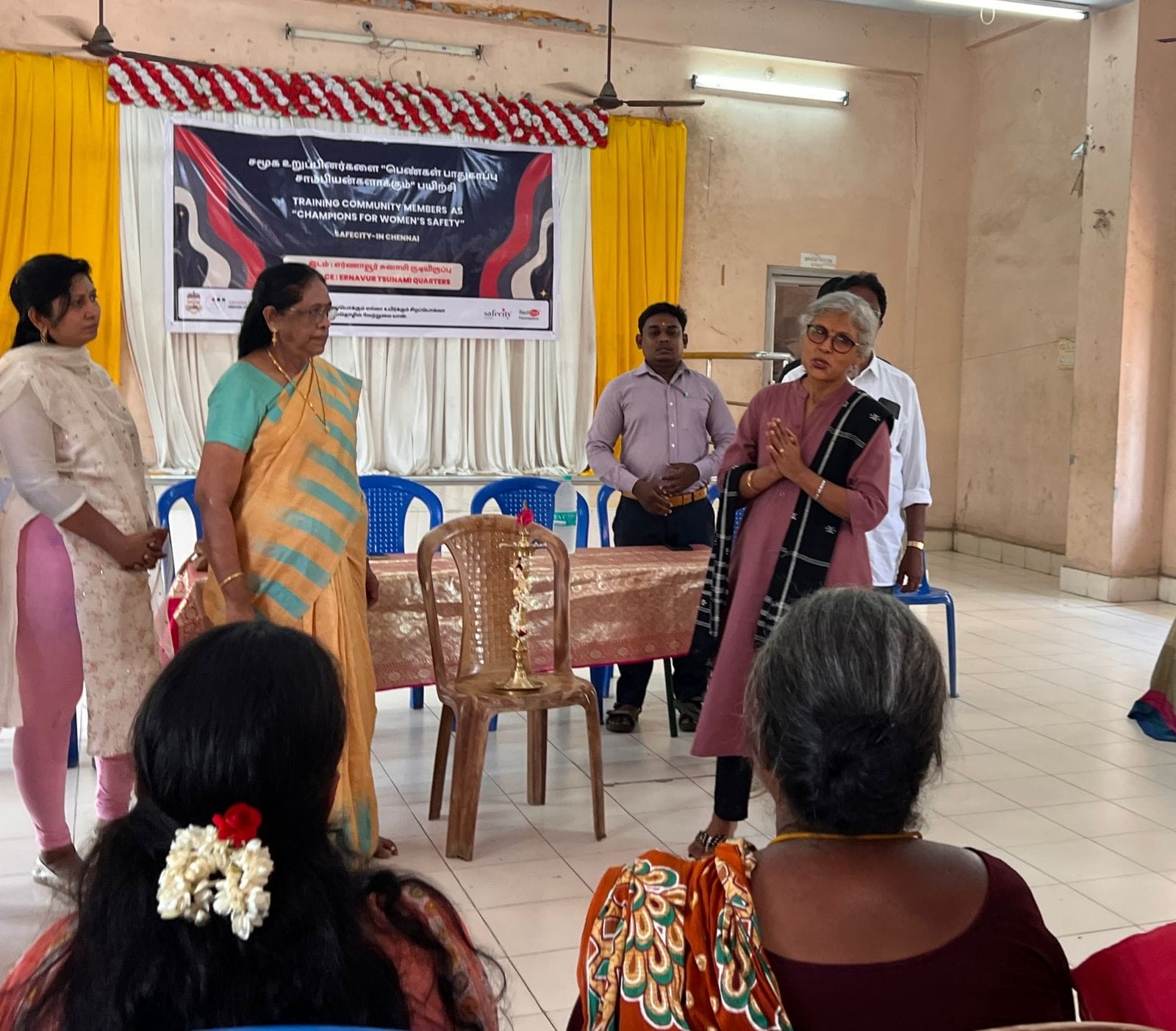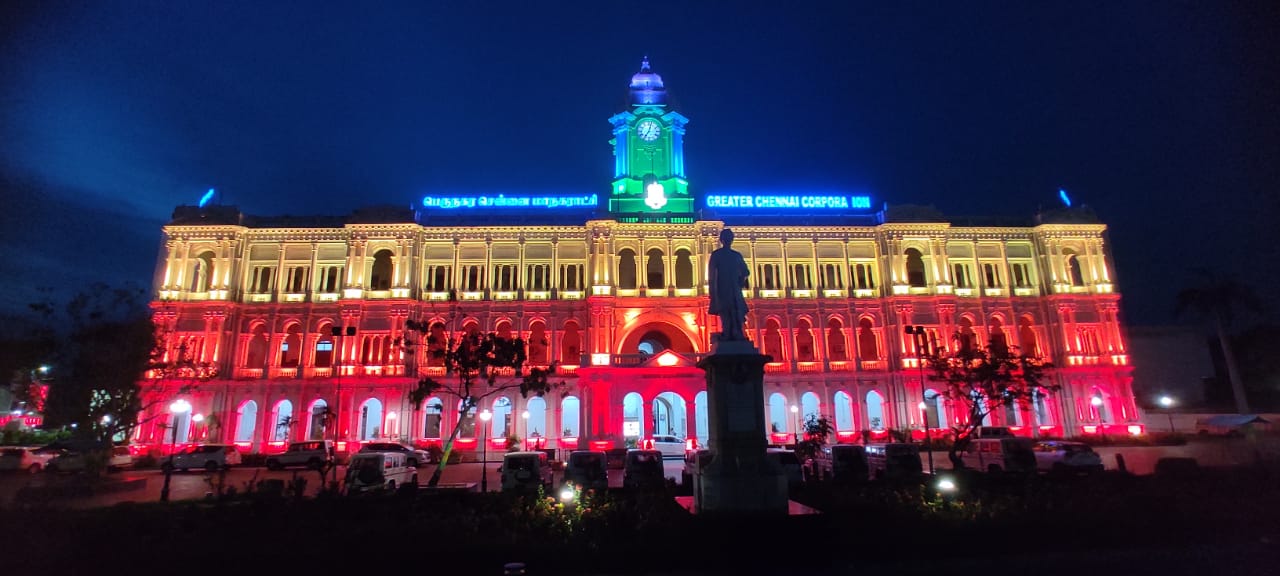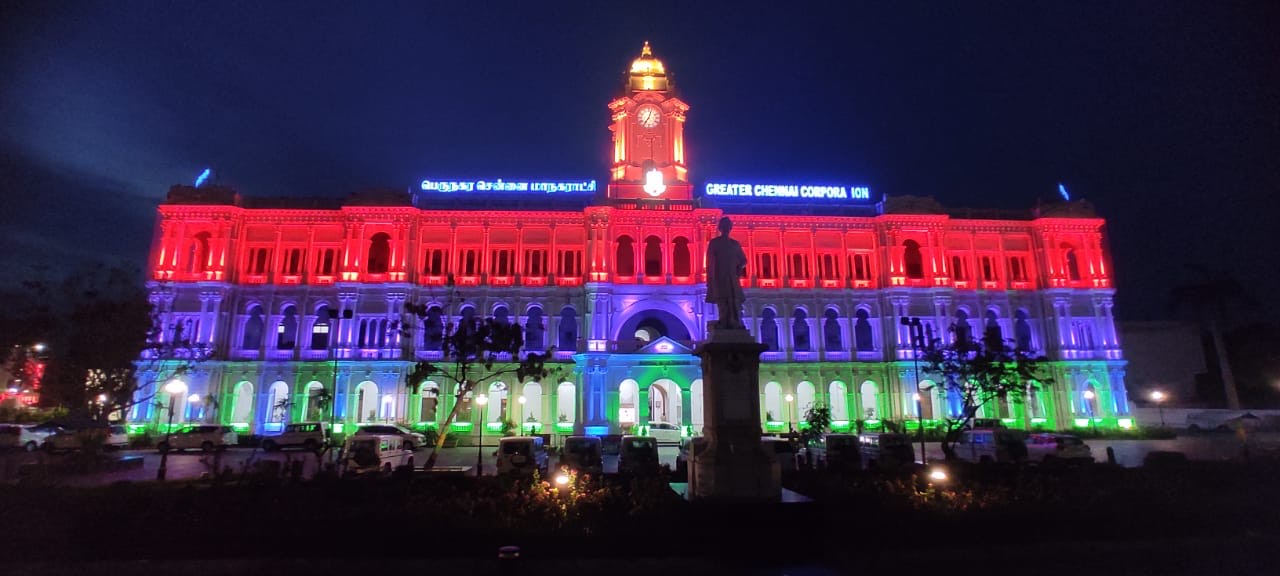Established in 2021, the Gender and Policy Lab in Chennai is working towards making Chennai safe – and changing the conversation on urban infrastructure, women, and autonomy.
With a focus on reimagining public infrastructure and policy through gender inclusive frameworks at a city planning level, the Gender and Policy Lab (GPL) has been relentless in their pursuit to make Chennai a safe city for women. Situated within the Greater Chennai Corporation (GCC), GPL –– no relation to Godrej Properties Limited! –– collaborates closely with multiple government departments, civil society organisations, elected representatives, and academic and research institutions. Their initiatives are centred around ensuring that women feel safe enough to access any public space in Chennai, whether for work or leisure.
At the Godrej DEI Lab, we have interacted with GPL’s work from the sidelines, but recently we had a chance to be in conversation with them up-close. We spoke extensively about GPL’s history and their current work in building a gender-inclusive Chennai with Meera Sundararajan, Gender and M&E expert, and former Team Lead at the Gender and Policy Lab, Greater Chennai Corporation. (Editor’s Note: This conversation has been edited and condensed for clarity. This interview was conducted in January, 2025.)
Gayatri: How did the Gender and Policy Lab (Chennai) come into being?
Meera: The story starts around 2021. The Government of Tamil Nadu had a project with the World Bank which was called the Chennai City Partnership Project Sustainable Urban Services program. The Greater Chennai Corporation is one of the bodies which is part of this project. The team conducted gap assessment studies, in the context of improving urban services mobility.
During the assessment, one of the things that came up was that there is a need to address issues of women safety, mobility, and access to public spaces. Upon having a discussion with the Government of Tamil Nadu, it was felt that there needs to be an independent body solely dedicated to addressing these issues. That’s how the Gender and Policy Lab (GPL) came into being.
But there was the question of where this lab would be hosted. Initially, it was discussed that perhaps the transportation department might be the right place, but we didn’t agree with that. We felt it had to be a place that’s accessible to everyone every day. That’s when the Greater Chennai Corporation proposed the idea of hosting us.
Gayatri: One of GPL’s key principles is to “provide safety, not protection” to create public spaces that women can navigate freely and safely; without the need for unsolicited protection. Could you explain what this would take?
Meera: This wasn’t something that was originally intended to be a core value of GPL. But it happened to be my perspective on the work we do vis-à-vis the work expected of us when it comes to women’s safe
Providing “protection” often implies that women are weak or that they don’t have the freedom and capability to go to work or college on their own. It implies that a male member of the family — a father or a husband — always must provide for the woman. This dynamic means that there is control over a woman’s movement in her day-to-day life; infringing her privacy.
GPL is more interested in thinking within the framework of “security” rather than “protection.” Security is more ecosystem related. For example — good roads, efficient public transportation, and widespread street lighting are examples of what makes an ecosystem.
We feel that security in a city makes it possible for women to access better opportunities. With good security, women can go to good schools, colleges, and workplaces. They don’t necessarily have to settle for what’s close to their homes. While “protection” can feel imprisoning, being in a safe city means you can go out, have fun, study, work, and earn money. You are acknowledged as an important being in the city.
Gayatri: GPL has been leading a campaign called the Safe Mobility Fellowship which uses safety audits to map out security and accessibility in a city. Could you tell us more about these initiatives?
Meera: We started the Safe Mobility Fellowship in 2023. Initially, we started having a conversation with this NGO called “Prajnya”. They wanted to talk to us about collaborating with students to conduct safety audits across the city. But college authorities had concerns about the safety of their students. We then decided to take the idea to the public – where we ended up getting a lot of traction via our website and social media! Out of fifty people who signed up to conduct these audits, we selected twenty-two and trained them on the safety audit principles along with “Safetipin” — a Gurgaon-based organization that’s a pioneer in conducting social audits using technology.
Next, was finding locations for the audit. We selected 46 points based on our experiences and inputs from the police – these were essentially transit points and the roads which led up to them. We divided ourselves into three groups, did thorough audits, and made detailed presentations.
These presentations were shared with department heads and interdepartmental working groups with senior officers like the Joint Commissioner of Police, the Deputy Commissioner of Police for Crime against Women and Children, and the Railway Protection Force. Additionally, we also spoke to the lead electrical engineer who is responsible for street lighting in the city. On the basis of these consultations, we did an infrastructure gap assessment.
The second exercise, not part of the fellowship but suggested by the police, was a mock drill which was supervised by the Deputy Commissioner of Police against Women and Children. We picked a few locations based on our safety audit, and from these locations, we called the police helpline to check how long they would take to respond and reach us.
The crucial feedback we gave the police through this drill was that when we made a call, we were asked which police station we were under. But in a distress situation, it is possible that a person might not know that! Another interesting insight was that the police are supposed to reach the location of a distress call in six minutes. In our case, the patrol took eight to ten minutes. Given the difficult traffic situation, this was quite a positive response!
 Image Caption: A moment from the “Safety Champions” training program for Women and Youth held at the TN Habitat Development Board Resettlement Colony in Ernavoor, Chennai in July 2024. Image Source: Meera Sundararajan.
Image Caption: A moment from the “Safety Champions” training program for Women and Youth held at the TN Habitat Development Board Resettlement Colony in Ernavoor, Chennai in July 2024. Image Source: Meera Sundararajan.
Gayatri: What, to you, are the risks as well as ethical imperatives associated with asserting technological measures such as CCTV cameras in public spaces for women’s safety?
Meera: Our surveys with women have revealed that women prefer having CCTVs in public because it makes them feel safer. They believe that more CCTVs means more surveillance and therefore, better security. Despite the fact that footage cannot be monitored 24/7, with CCTVs, if a crime has been committed, we know we can check for specific instances and time stamps. A lot of us who lead by feminist thought might not agree with more CCTVs in public spaces. Because to us, it feels intrusive. But our surveys with women indicate otherwise.
Even then, CCTVs have limited scope. Let’s take office spaces, for example. We don’t have CCTVs in offices because it implies mistrust of employees. But having them installed doesn’t mean sexual harassment won’t happen! We need to keep thinking about broader ways to acknowledge safety beyond just thinking about tech-based measures.
Gayatri: During Pride Month, the Greater Chennai Corporation was lit up in rainbow colours to honour LGBTQIA+ communities. What are your thoughts on Tamil Nadu’s progressive stance on gender inclusivity and its affirmative court rulings?
Meera: Tamil Nadu is among the few Indian states that has policies in place for LGBTQIA+ communities and has specific policy provisions for the transgender community. They get free tickets to travel on buses and they have reservations in academic institutions and jobs. In Tamil, colloquial terminology referring to trans people has derogatory meanings. Keeping this in mind, the Tamil Nadu government has also supported the production of a vocabulary that is respectful of and affirming to trans people.
Coming to your question, the Greater Chennai Corporation building is a heritage building which is lit up every day. During Pride Month, requests to light the building in rainbow colours started to pour in. While we were coordinating with the respective administrative offices to process these requests and get permissions, an interesting thing happened. We got questions like, “What is LGBTQIA+?” especially from the electrical department and the junior staff. And this gave us an opportunity to start a conversation about queer existence and queer realities!
The lighting up of the building itself sparked conversation – what was significant was that the Greater Chennai Corporation was the first government building to do so. We were really thankful for this. This decision was approved by the Honourable Mayor of Chennai and the then Commissioner of GCC. There were detractors who said, “Should we do this?” and what not. We also saw something similar on our social media channels where trolls occupied our comment sections. But overall, many people were happy about our decision, and it came off positively.

 Image Captions: The Ripon Building lit up in the LGBTQIA+ flag colours on 31st June, 2024 to acknowledge Pride Month. Image Source: Meera Sundararajan.
Image Captions: The Ripon Building lit up in the LGBTQIA+ flag colours on 31st June, 2024 to acknowledge Pride Month. Image Source: Meera Sundararajan.
Gayatri: Inclusivity also means addressing intersectional realities. For example, public transport and its accessibility for women with disabilities. How does GPL acknowledge these realities?
Meera: In our perception study on women’s safety in Chennai, women with disabilities shared their experiences with accessing public transport and we conveyed these insights to the transport department in the city. We also did a similar survey on civic infrastructure connected to transport — like overhead bridges or subways — where we considered both safety and accessibility.
More broadly, Chennai has a vibrant and active disability justice community like the Disability Rights Alliance. Even during the elections in the city in May 2024, the polling booths here were audited to check how many conformed to accessibility guidelines and there was a monitoring system to keep a check on the range of accessibility at polling booths.
Gayatri: What are GPL’s future plans to advance its groundwork in creating a safe city?
Meera: A core focus right now is on bystander intervention. This was a part of our perception study that we conducted with a sample of 3,000 people – comprising of men, women, and trans people.
According to the study, 62% women who have experienced harassment said, no one in their immediate vicinity intervened. That’s a mindset we want to change. Currently, our communications team is working on films that explain the ways in which a bystander can intervene in ways that are respectful and necessary. This campaign has a Tamil tagline — “thappu nu therinja pattinu kelu” — which roughly translates to “if you think something is wrong, question it.” Two of these films have been released. (Editor’s Note: You can watch the films here, and here.)
Additionally, we also plan on organizing training workshops specifically on and about bystander intervention. We are hoping to make training modules for colleges, government offices, and corporates on the issue.
__
Text by Gayatri Shanbhag. Gayatri is a maker, writer, researcher, and educator interested in anti-colonial queer feminist design studies and pedagogy, and history.